Coty Continues Momentum in Q4, with Topline and Profit Exceeding Guidance
SHARE WITH :
Financial IMAGES
NEW YORK - August 26, 2021-- Coty Inc. (NYSE: COTY) ("Coty" or "the Company") today announced another quarter of improvement in its financial results and demonstrated recovery across its operations for the fourth quarter of fiscal year 2021, ended June 30, 2021.
In Q4, revenues increased 89.6%, or 80.7% LFL, lapping the peak of COVID impact in the prior year, even as COVID-related restrictions continued in many markets. As a result, Coty ended the year with revenues of $4.63 billion, above the high end of its $4.5-4.6 billion guidance range. While all regions returned to YoY growth in Q4, the U.S. and China markets were standouts. The Americas region grew 67% in Q4 and 6% in FY21, with the full year performance driven by double-digit growth in U.S. prestige products, and growth in Brazil and Canada. Asia Pacific grew 59% in Q4, with China growing double digits on a quarterly and full-year basis both year-on-year and versus FY19. EMEA sales more than doubled in Q4, even as many markets remained under restrictions through most of the quarter, with the consumer beauty brands recording stable market share for the first time in over 5 years. Underpinning the global momentum was the continued strength in e-commerce, which grew nearly 19% in Q4 and 34% in FY21, resulting in a high-teens e-commerce penetration for the year.
Coty's prestige brands sales more than doubled in Q4 and were nearly flat LFL in FY21, even as the Company continued to reduce sales in low quality channels, which represented a low teens negative impact to prestige brand sales in Q4 and a high single digit negative impact in FY21, relative to FY19. Nearly all prestige brands were up double- to triple-digits, with standout performance from Gucci, Marc Jacobs, Burberry, Calvin Klein, and Chloe, supplemented with expansion in Coty's new growth engines, prestige cosmetics and skincare.
In the mass channel, Coty continued to strengthen its consumer beauty brands, reaching a key milestone with CoverGirl gaining market share for three consecutive months, a first for the brand in 5 years. Building on this momentum, Coty launched the new brand repositioning for Rimmel in June, followed by Max Factor in late July. Coty's mass beauty revenues increased 37.9% LFL in Q4, with growth across each region.
Over the course of the year, Coty also advanced on its strategic pillar to become a beauty leader in sustainability. The Company announced its partnership with Lanzatech, becoming the first company in the fragrance industry to introduce sustainable ethanol, created using carbon-capture technology, into its fragrance products with the goal of having the majority of its fragrance portfolio using carbon-captured ethanol by 2023. On the cosmetics side, Coty has been leading with clean, vegan and cruelty-free formulations across brands such as CoverGirl, Sally Hansen, and Kylie Cosmetics. This has solidified Coty as the #2 player in clean cosmetics, as tracked by U.S. Nielsen.
During the quarter, Coty continued to reduce its cost base, with savings totaling approximately $70 million in the quarter. This brought the FY21 savings to over $330 million, exceeding the Company's initial plan for the year by over $100 million. Coty remains on track to generate ~$600 million of savings by FY23, and is identifying additional savings opportunities beyond FY23. At the same time, Coty now expects one-time cash costs associated with the cost savings program to come in approximately $100 million below the original target, aided by the strong cash focus of the Company. The company's efforts to drive gross margin expansion through a combination of product and channel mix, COGS savings and improved excess & obsolescence resulted in a reported and adjusted gross margin of ~60% for the year, up ~200bps YoY and in line with FY19 levels on a Continuing Operations basis, despite a lower sales base. The combination of gross margin expansion and accelerated cost savings allowed Coty to deliver profitability above expectations, while simultaneously reinvesting in the business. Specifically, in Q4 working media investments increased triple-digits versus last year and up over 30% versus 4Q19. At the same time, Coty delivered FY21 reported operating loss of $48.6 million and an adjusted EBITDA $760.4 million, exceeding guidance of ~$750 million and reflecting an adjusted EBITDA margin of 16.4%, delivering over 300 bps of margin expansion versus FY19. Q4 EPS totaled $(0.27) as reported and $(0.09) adjusted. The adjusted EPS is impacted by non-operational items including deferred financing fee write-offs, annual catch-up of tax expenses, and the impact of the convertible preferred shares on the diluted EPS calculation.
At the end of Q4, Financial Net Debt totaled approximately $5.2 billion. With an increase in the value of Coty's retained Wella stake to approximately $1.26 billion1 at quarter-end, the Company's Economic Net Debt totaled approximately $4.0 billion. During the quarter, Coty successfully raised $900 million in secured notes in April and €700 million in secured notes in June 2021, significantly improving the maturity profile of its debt.
Commenting on the operating results, Sue Y. Nabi, Coty's CEO, said:
"Today marks the completion of transformational year for Coty, as we advance on our journey in strengthening Coty's position as a global beauty powerhouse. Over the last 12 months, we have built a leadership team of beauty and transformation experts, unveiled and began executing on our multi-year strategy, completed the divestiture Wella, significantly improved our leverage profile, and over-delivered on our savings, revenue, and profit objectives.
We have ended the year on a high note, with Q4 sales nearly doubling YoY. Sales in the Americas expanded in FY21, and we saw particular strength in the U.S. and China. This a true testament not only to the strength of our prestige brand portfolio, but also to our innovation capabilities, with Marc Jacobs Perfect the best performing U.S. fragrance launch in the industry over the last 3 years, Gucci Guilty Pour Homme and Burberry Her driving market share gains for the beauty brands, and Chloe Atelier des Fleurs solidifying its position as a leading ultra premium artisanal fragrance collection.
At the same time, we made great strides on our objectives of becoming a key player in prestige cosmetics and strengthening our skincare portfolio. Gucci and Burberry makeup are already amongst the Top 25 makeup brands in China overall only a couple of years post launch, and Gucci makeup now ranks in the Top 10 within the U.S. and Europe doors where it is present. We intend to capitalize on this momentum in FY22, significantly expanding both our distribution and assortment. On skincare, Lancaster is elevating its visibility with Chinese consumers, with 3 branded counters opening in Hainan in the last few months, while philosophy is capitalizing on its Top 10 skincare position in the U.S. by leaning into cleaner formulations and expanded distribution.
Finally, in our consumer beauty brands, we are clearly seeing CoverGirl's transformation take hold with consumers, as the brand gained market share for three consecutive months, for the first time in 5 years. We are excited about the path ahead for Rimmel and Max Factor, as the new brand positioning, communication and visuals are being introduced now across European markets.
This operational and strategic progress was achieved without sacrificing our financial delivery, with FY21 gross margins of 60% back to FY19 levels and adjusted EBITDA margin of 16% up over 300 bps vs. FY19, setting the baseline for further expansion in the coming years.
Importantly, with two months into the new FY22 year, I am extremely encouraged by the momentum we are seeing across the business. In the market, we are seeing strong fragrance demand across the U.S. and China, some early signs of recovery in Europe and Travel Retail, and improving cosmetics trends. And we are capitalizing on this more favorable demand backdrop with a line-up of strong launches in each core area of the business. In fragrances we are already seeing very strong market reception for our launches including Gucci Flora Gorgeous Gardenia with Miley Cyrus, Burberry Hero with Adam Driver, Calvin Klein Defy with Richard Madden, and Tiffany Rose Gold. And in cosmetics, the newly relaunched Kylie cosmetics line is seeing great momentum on- and off-line in the U.S. and across Europe, while Sally Hansen is once again disrupting the nail market with its new concept, It Takes Two.
As we continue to make tangible progress in each of our focus areas, I am more confident than ever in the growth and value creation path in front of Coty."
*Adjusted financial metrics used in this release are non-GAAP. See reconciliations of GAAP results to Adjusted results in the accompanying tables.
1Based on fair market value, reflecting the final Wella capital structure
Highlights
- 4Q21 net revenues increased 89.6% as reported and 80.7% LFL. Despite COVID-related restrictions in certain markets during the quarter, 4Q21 net revenue trends showed strong improvement across all regions. For FY21, net revenues declined 2% as reported and 3.5% LFL, while showing sequential improvement through the year
- 4Q21 reported operating income was $1.8 million, while the FY21 reported operating loss was $48.6 million
- 4Q21 adjusted operating income increased to $44.3 million from an adjusted operating loss of $335.3 million.
- 4Q21 adjusted EBITDA of $127.3 million, increased significantly from $(246.6) million last year, with an adjusted EBITDA margin of 12.0%
- FY21 adjusted EBITDA of $760.4 million exceeded our guidance of $750 million, and was up from $174.6 million in FY20
- FY21 reported EPS of $(0.22) and adjusted EPS of $0.01, significantly improving from $(0.48) in FY20
- 4Q21 cost reductions remained solid with an additional approximately $70 million of reductions, bringing the FY21 total to over $330 million
- 4Q21 free cash was neutral, improving from an outflow of $316.4 million last year through cost reductions and lower cash paid for taxes, interest and capital projects.
- Financial Net Debt increased $121.4 million to $5,228.0 million primarily due to FX headwinds and refinancing costs as Coty significantly improved its debt maturity profile in 4Q21. Economic Net Debt now $3,968.0 million at quarter end.
- Strong immediate liquidity of $2,323.2 million at end-quarter and the Company is in compliance with our financial covenants.
Outlook
Entering 1Q22, Coty continues to see fragrance market momentum in U.S. and China, with some signs of recovery in EMEA and in broader color cosmetics. The combination of this market backdrop and Coty's strong launch calendar are fueling strong sales momentum in 1Q22, with very strong double digit growth in July and August to date. As a result, Coty expects 1Q22 LFL sales growth in the high teens percentage.
With the base year comparisons getting more difficult in subsequent quarters and some uncertainty in market conditions due to the Delta variant of COVID, Coty is targeting FY22 LFL sales growth in the low teens coupled with adjusted EBITDA of ~$900 million on a constant currency basis, reflecting strong EBITDA margin expansion YoY. The Company continues to target leverage moving towards 5x exiting CY21, and a further reduction in leverage to approximately 4x exiting CY22.
Additional Updates
Considering the dynamism of the beauty market, Coty is always on the lookout for opportunities to leverage its assets to create value and fuel growth.
In order to support the growth of the Brazil business and Coty’s personal care brands, Coty confirms that it is pursuing a partial IPO of its Brazil business. Earlier today, Coty completed its first filing at CVM - the Securities Commission which regulates capital markets - in Brazil to commence this partial IPO process. If the offering is successful, this will also help advance Coty’s deleveraging agenda.
Coty intends to remain a controlling shareholder of the Brazil affiliate.
Due to local Brazilian regulations, following its first filing Coty cannot offer further details at this time but will provide updates in due course. Additional information about the partial IPO of the Brazil business can be accessed on the CVM website.
Financial Results
Refer to “Non-GAAP Financial Measures” for discussion of the non-GAAP financial measures used in this release; reconciliations from reported to adjusted results can be found at the end of this release.
Revenues:
- 4Q21 reported net revenues of $1,062.4 million increased 89.6% year-over-year, including a positive foreign exchange (FX) impact of 8.9%. LFL revenue increased 80.7%, driven by LFL increases in the EMEA segment of 106.3%, the Americas of 67.2%, and Asia Pacific of 58.7%. By channel, LFL sales increased 147.1% in prestige and 37.9% in mass, even as cuts in low quality channels impacted prestige sales trends by a low teens percentage versus 2019.
- FY21 net revenues of $4,629.9 million decreased 1.9% year-over-year, including a positive FX impact of 1.7%. LFL revenue decreased 3.5%, driven by LFL decreases in EMEA of 10.1% and Asia Pacific of 5.4%, partly offset an increase in the Americas of 5.5%. By channel, LFL sales in prestige were nearly flat even as cuts in low quality channels impacted prestige sales trends by a high single digit percentage versus 2019, while mass LFL sales declined 6.9%.
Gross Margin:
- 4Q21 reported gross margin of 60.4% increased from 40.0% in the prior-year period, while adjusted gross margin of 60.9% increased from 40.6% in 4Q20. The increase was due to the year-over-year improvement in volumes, revenue mix, and lower excess & obsolescence.
- FY21 reported gross margin of 59.8% increased from 57.8% in the prior-year period, while adjusted gross margin of 60.0% increased from 58.1% in the prior year, primarily due revenue mix and lower excess & obsolescence.
Operating Income and EBITDA:
- 4Q21 reported operating income of $1.8 million improved from a reported operating loss of $920.5 million in the prior year due to a $393.6 million reduction in asset impairment costs, $114.5 million reduction in restructuring and other business realignment costs, a higher gross margin, lower SG&A expenses, and a $60.9 million reduction in acquisition and divestiture related expenses.
- 4Q21 adjusted operating income of $44.3 million rose from a loss of $335.3 million in the prior year, while the adjusted EBITDA of $127.3 million improved from $(246.6) million in the prior year. The $373.9 million increase was driven by a higher gross margin and continued fixed cost reductions across both people and non-people costs. For 4Q21, the adjusted operating margin increased 6,400 bps to 4.2%, while the adjusted EBITDA margin increased 5,600 bps to 12.0%.
- FY21 reported operating loss of $48.6 million improved from a reported operating loss of $1,236.5 million due primarily to a reduction in restructuring and other business realignment cost, no asset impairment costs, as well as lower media investments, fixed cost expenses, and a higher gross margin. FY21 adjusted operating income increased to $409.4 million from a loss of $161.7 million, with a margin of 8.8%, while the adjusted EBITDA totaled $760.4 with a margin of 16.4%.
Net Income:
- 4Q21 reported net loss of $221.1 million improved from a net loss of $696.2 million in the prior year, due to the aforementioned increase in reported operating income, partially offset by higher taxes and interest expense compared to the year-ago period.
- The 4Q21 adjusted net loss of $67.2 million compared to an adjusted net loss of $353.7 million in the prior year period.
- FY21 reported net loss of $166.3 million improved from a net loss of $1,100.4 million in the prior year. FY21 adjusted net income of $9.6 million improved from an adjusted net loss of $364.2 million in the prior year.
Earnings Per Share (EPS) - diluted:
- 4Q21 reported loss per share of $(0.29) improved from a reported loss per share of $(0.91) in the prior year.
- 4Q21 adjusted EPS of $(0.09) improved from $(0.46) in the prior year. The Q4 adjusted EPS included approximately 2 cents of impact from deferred financing fee write-offs following the refinancing transactions in the quarter and 3 cents from the expensing of the convertible preferred coupon based on accounting treatment during periods of negative net income.
- FY21 reported loss per share of $(0.22) improved from a reported net loss per share of $(1.45) in the prior year.
- FY21 adjusted EPS of $0.01 increased from $(0.48) in the prior year.
Operating Cash Flow:
- 4Q21 cash provided by operations of $32.3 million improved from $(255.4) million in the prior-year period, primarily reflecting an increase in net income on a cash basis partially offset by working capital declines. Year-to-date operating cash flow totaled $318.7 million, an increase of $369.6 million from the same period of the prior year.
- 4Q21 free cash flow of $2.1 million improved from a free cash outflow of $316.4 million in the prior year driven by the increase in operating cash flow of $287.7 million coupled with a $30.8 million reduction in capex. FY21 free cash flow of $144.8 million increased from a free cash outflow of $318.3 million in the prior year.
Financial Net Debt:
- Financial Net Debt of $5,228.0 million on June 30, 2021 increased from $5,106.6 million on March 31, 2021, driven primarily by negative FX impact.
Immediate Liquidity:
- Coty ended 4Q21 with $253.5 million in cash and cash equivalents, and immediate liquidity of $2,323.2 million.
Fourth Quarter Business Review by Segment
Americas
In 4Q21, Americas net revenues of $447.2 million or 42% of Coty sales, increased by 68.9% versus the prior year. On a LFL basis, Americas net revenues increased by 67.2%. Prestige brand sales generated very strong growth, increasing in the triple-digits with robust performance across fragrances, cosmetics, and skincare. Meanwhile, mass beauty product sales also delivered solid growth, up strong double-digits, as color cosmetics began to show improvement during the quarter. For FY21, Americas net revenues of $1,866.9 million rose 5.4% versus the prior year and increased 5.5% LFL.
During 4Q21, Coty's U.S. prestige fragrance brands continued to generate very robust sell-out growth. Performance was particularly strong at Marc Jacobs, Gucci, Hugo Boss, and Burberry. Marc Jacobs continued to deliver very strong sell-out growth, up triple-digits versus last year in June, making it the fastest growing top 10 luxury fragrance brand, which was driven by continued strength of Marc Jacobs Perfect. Encouragingly, Marc Jacobs Perfect is the #1 launch in the U.S. market in the past 3 years* and the best Coty launch since 2005. Meanwhile, Burberry Her continued to excel during the quarter, with triple-digit sell-out growth. Similar to recent quarters, Gucci fragrance and cosmetic sell-out continues to be very strong. Within fragrances, the performance was led by Gucci Guilty Pour Homme, which is now the #5 male fragrance in the market. For cosmetics, Gucci delivered another quarter of triple-digit sell-out growth.
Within mass beauty brands, cosmetics and fragrances started to show improvement during 4Q21, though both categories remained below 2019 levels. However, the Company had encouraging results in its strategy of stabilizing the performance of its mass brands. In particular, CoverGirl gained nearly 1 point of share during the quarter. This performance was supported by the recent Lash Blast Clean launch, which delivered very strong sell-out in the quarter, outperforming the overall clean market and becoming the #11 mascara in the total U.S. market. In addition, Simply Ageless has also generated strong sell-out performance, with all top customers seeing double-digit growth for 3 consecutive months. Meanwhile, Sally Hansen also continued to gain market share in the U.S., with sell-out also remaining solidly up versus 2019 levels.
E-commerce sales increased 36% in Q4, despite lapping a difficult comparison last year. For FY21, e-commerce growth remained over 60% fiscal year-to-date. Fiscal year-to-date, e-commerce penetration is in the low double-digits, up a mid-single-digit percent from last year.
The Americas segment generated a reported operating loss of $18.8 million in 4Q21, compared to a reported operating loss of $128.5 million in the prior year. The 4Q21 adjusted operating income was $8.0 million, increased from an adjusted operating loss of $102.9 million in the prior year, driven by gross margin improvement and strong fixed cost reduction. The 4Q21 reported operating margin was (4.2%) and the adjusted operating margin was 1.8% versus (38.9)% in the prior year. Adjusted EBITDA for the Americas segment increased to $47.6 from $(58.8) in the prior year, with a margin of 10.6%. FY21 reported operating income of $36.5 million compared to a reporting operating loss of $164.8 million in the prior year. The FY21 adjusted operating income was $141.5 million versus $(89.5) million in the prior year. Adjusted EBITDA in FY21 was $301.1 million compared to $56.1 million in the prior year.
*Source: The NPD Group, Inc. / U.S. Prestige Beauty Total Measured Market, Fragrance Brand Launch Sales, July-June 2018, 2019, 2020
EMEA
In 4Q21, EMEA net revenues of $471.4 million, or 44% of Coty sales, increased by 123.4% versus the prior year. On a LFL basis, EMEA net revenues increased 106.3%. Despite COVID-related restrictions impacting many markets during the quarter, sales trends for both prestige and mass brands showed strong improvement, up triple-digits and double-digits, respectively. For FY21, EMEA net revenues of $2,183.7 million declined 5.4% reported from the prior year and 10.1% LFL.
EMEA prestige sales performance was led by Hugo Boss Bottled, Marc Jacobs Perfect. Meanwhile, Gucci Beauty continued its strong performance in the quarter, and remains in the top 5 makeup brands in the stores where its present in many key markets including France, Italy, and Russia. In the mass beauty channel, sell-out trends meaningfully improved during the quarter. Encouragingly, Coty commenced the repositioning of Rimmel towards the end of the quarter in June, with the brand holding its #1 position in the UK makeup market and achieving its highest market share in 10 consecutive months. More recently, Coty began the re-positioning of Max Factor earlier this month.
4Q21 EMEA e-commerce sales grew over 20% in 4Q. FY21 e-commerce penetration as a percentage of sales was in the high-teens percentage level, with strong growth in both prestige and mass.
Reported operating income was $0.1 million in 4Q21 versus reported operating loss of $318.0 million in the prior year. The 4Q21 adjusted operating income of $29.4 million increased from an adjusted operating loss of $182.4 million in the prior year, driven by a higher gross margin, and solid fixed cost reductions. For 4Q21, the reported operating margin was neutral and the adjusted operating margin increased to 6.2% from (86.4)% in the prior year. During the quarter, adjusted EBITDA increased to $63.8 million from $(150.7) million in the prior year, with a margin of 13.5%. For FY21, reported operating income increased to $129.8 million from a reported operating loss of $(248.4) million in the prior year. The FY21 adjusted operating income of $251.9 million increased from an adjusted operating loss of $(18.0) million in the prior year. For the year, adjusted EBITDA increased to $400.2 million from $124.2 million in the prior year.
Asia Pacific
4Q21 Asia Pacific net revenues of $143.8 million, or 14% of Coty sales, increased 70.0% on a reported basis and rose 58.7% LFL. The robust LFL performance was largely fueled by strong trends within Coty's prestige brands, including triple-digit prestige growth in China. For FY21, Asia Pacific net revenues of $579.3 million declined 0.6% as reported and 5.4% LFL from the prior year.
In China, Coty continued to see very strong, near triple-digit, sell-out performance of its prestige beauty brands in both the brick & mortar and e-commerce channels. During 4Q21, Coty outperformed the prestige beauty market in China, and gained 1 rank to become the #9 prestige beauty company. Similar to recent quarters, Burberry and Gucci have delivered particularly strong performance, double- to triple-digit-sell-out growth in the quarter. Moreover, both brands continue to see very strong momentum within their prestige cosmetics products, both of which are in the top 25 prestige make-up brands in China.
E-commerce generated very strong growth, increasing at a triple-digit rate during 4Q21, with FY21 penetration in the low-teens.
Reported operating loss in 4Q21 of $2.3 million increased from a reported operating loss of $56.7 million in the prior year. The 4Q21 adjusted operating income of $3.3 million increased from an adjusted operating loss of $50.4 million in the prior year, driven by a higher gross margin coupled with reduced fixed costs. The 4Q21 reported operating margin was (1.6%) and the adjusted operating margin of 2.3% increased from (59.6)% in the prior year. For 4Q21, adjusted EBITDA improved to $15.9 from $(37.1) in the prior year, with a margin of 11.1%. For FY21, reported operating loss of $13.2 million improved from a reported operating loss of $74.0 million in the prior year. The adjusted operating income for FY21 was $10.9 million as compared to an adjusted operating loss of $49.0 million in the prior year. The FY21 adjusted EBITDA increased to $59.1 million from $(6.5) million in the prior year.
Fourth Quarter Fiscal 2021 Business Review by Channel
Prestige
- During the quarter, prestige net revenues of $570.2 million, or 53.7% of Coty sales, increased 159.9% as reported and increased 147.1% LFL. This was driven by an improvement in sales trends across regions, particularly the U.S, driving the Americas region to very strong triple-digit revenue growth. The EMEA region delivered triple-digit growth as well, with positive momentum across many key markets, despite COVID-related lockdowns remaining in place for much of the quarter. Encouragingly, China also continued to generate robust growth, increasing triple-digits in the quarter, and up versus 4Q19. By brand, Gucci, Marc Jacobs, Burberry, Calvin Klein, and Chloe were stand-outs in the quarter.
- During 4Q21, Coty continued to execute on its newest pillars of growth: expanding its presence in prestige skincare, prestige cosmetics, and China. In U.S. prestige skincare, philosophy is the fastest growing skincare brand on Amazon. Importantly, the repositioning has commenced with additional milestones planned in 1H22. Within prestige cosmetics, Gucci Beauty and Burberry continue to see very strong trends with triple-digit sell-out growth in the U.S. and Asia Pacific.
- In FY21, prestige net revenues of $2,718.6 million, or 58.7% of Coty sales, increased 4.3% as reported, but declined (0.9)% LFL.
- Prestige e-commerce sales grew 37% in FY21, representing a mid 20s penetration rate of Prestige sales for FY21.
Mass
- During 4Q21 sales trends improved as COVID-related restrictions, including mask wearing, continued to ease globally. In 4Q21, mass net revenues of $492.0 million, or 46.3% of Coty continuing operations, increased 44.4% as reported and increased 37.9% LFL. The rebound in mass channel sales was primarily driven by the EMEA and Americas regions, which were up strongly double-digits. Meanwhile Asia Pacific increased, albeit at a slower pace.
- Importantly, Coty remained focused on stabilizing its mass beauty sales. CoverGirl, the first mass brand repositioned, delivered very strong performance during 4Q21 as the brand gained market share for three consecutive months, with the brand outperforming the U.S. color cosmetics markets during the quarter. In addition, Coty began the repositioning of Rimmel towards the very end of 4Q21, with promising early results as the brand has achieved its highest market share in 10 consecutive months in the U.K. Moreover, the re-positioning of Max Factor has recently begun.
- In FY21, mass net revenues of $1,910.7 million, or 41.3% of Coty sales, decreased 9.5% as reported and 6.9% LFL.
- Mass e-commerce sales increasing 25% in FY21 and represented a high-single-digit percent of Mass sales.
Noteworthy Company Developments
Other noteworthy company developments include:
- On April 21, 2021, Coty completed the issuance of $900 million of 5.000% senior secured notes due in 2026. The offering was upsized to $900 million from the initial expectation of $750 million due to very strong demand. The proceeds are net leverage neutral and have been used to partially paydown FY23 term loans, resulting in reduced refinancing risk.
- On May 26, 2021, Coty announced the appointment of Andrew Stanleick as CEO of Kylie Jenner Beauty Brands. Mr. Stanleick will also manage Kim Kardashian West's business for Coty, with a focus for both brands on driving global expansion and entry into new beauty categories. Mr. Stanleick will also maintain his role as Coty EVP Americas.
- On June 9, 2021, Coty completed the issuance of €700 million of 3.875% senior secured notes due in 2026. The offering was upsized to €700 million from the initial expectation of €500 million due to very strong demand. The proceeds are net leverage neutral and have been used to partially paydown FY23 term loans, further reducing refinancing risk.
- On June 25, 2021, Coty announced Richard Jones to step down from his role as Chief Supply Officer and Head of R&D. Coty intends to separate these roles into two positions, appointing an expert leader over each of Supply Chain and R&D. These new appointments will be announced in due course. In the interim, current Coty leaders will be assuming these responsibilities.
- On July 1, 2021, Coty announced the relaunch of Kylie Cosmetics with new and improved clean and vegan formulas, along with refreshed packaging. Consumers can now shop the brand globally through select brick and mortar retailers and a new direct-to-consumer website that offers access to both Kylie's cosmetics and skincare brands.
- On July 12, 2021, Coty announced the introduction of a digitally-enabled touch-less fragrance testing device intended for use at beauty retailers within the next 12 months. Real world testing of the units at brick & mortar retail stores began in July in key European markets, followed by a planned trial in Asia later this year.
- On July 22, 2021, Coty announced the appointment of Constantin Sklavenitis to the role of Chief Prestige Brands Officer, effective September 6, 2021. Mr. Sklavenitis will be overseeing all prestige brands, and be responsible for one of Coty's strategic growth pillars, namely to become a key player in Prestige make-up and expand in skincare.
Conference Call
Coty Inc. will host a conference call at 8:00 a.m. (ET) today, August 26, 2021 to discuss its results. The dial-in number for the call is (800) 895-3361 in the U.S. or (785) 424-1062 internationally (conference passcode number: COTY4Q21). The live audio webcast and presentation slides will be available at http://investors.coty.com. The conference call will be available for replay.
- Tables Follow -
COTY INC. SUPPLEMENTAL SCHEDULES INCLUDING NON-GAAP FINANCIAL MEASURES
RESULTS AT A GLANCE
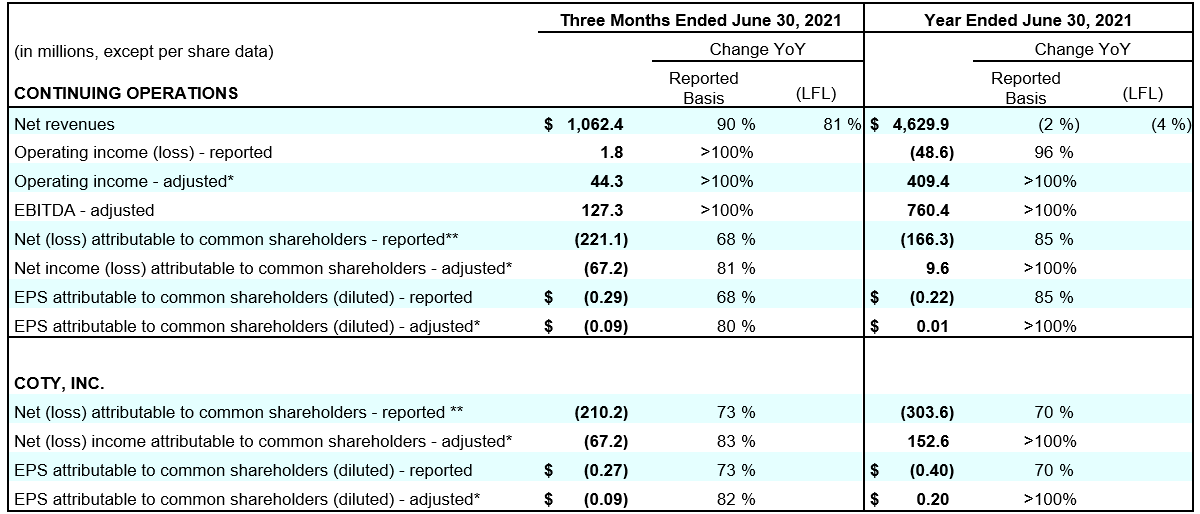
* These measures, as well as “free cash flow,” “adjusted earnings before interest, taxes, depreciation and amortization (adjusted EBITDA),” "immediate liquidity," “financial net debt,” and "economic net debt" are Non-GAAP Financial Measures. Refer to “Non-GAAP Financial Measures” for discussion of these measures. Net income (loss) represents Net income (loss) Attributable to Coty Inc. Reconciliations from reported to adjusted results can be found at the end of this release.
** Net income (loss) for Continuing Operations and Coty Inc. are net of the Convertible Series B Preferred Stock dividends.
FOURTH QUARTER BY SEGMENT (CONTINUING OPERATIONS)
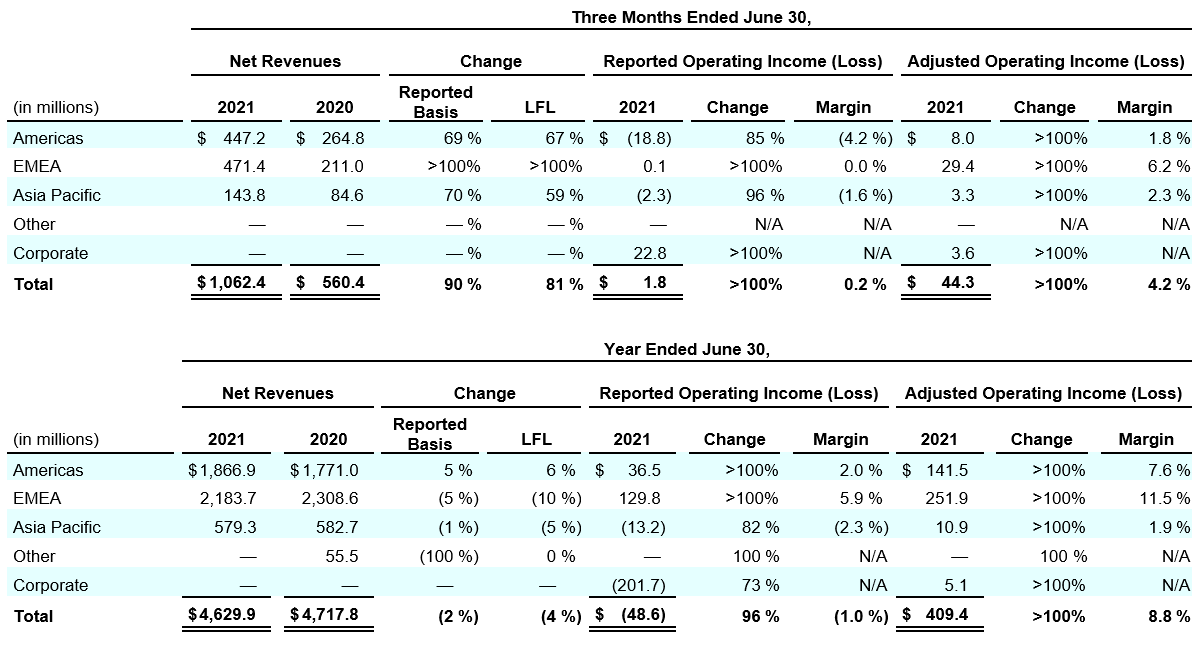
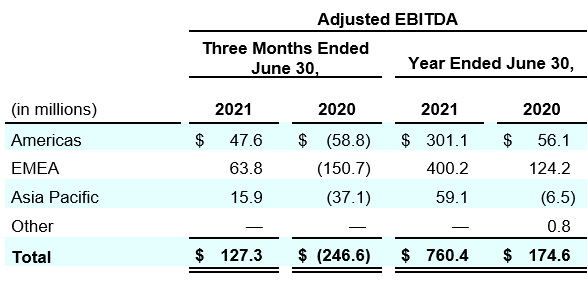
FOURTH QUARTER FISCAL 2021 BY CHANNEL
Continuing Operations

COTY INC. & SUBSIDIARIES
CONDENSED CONSOLIDATED STATEMENTS OF OPERATIONS
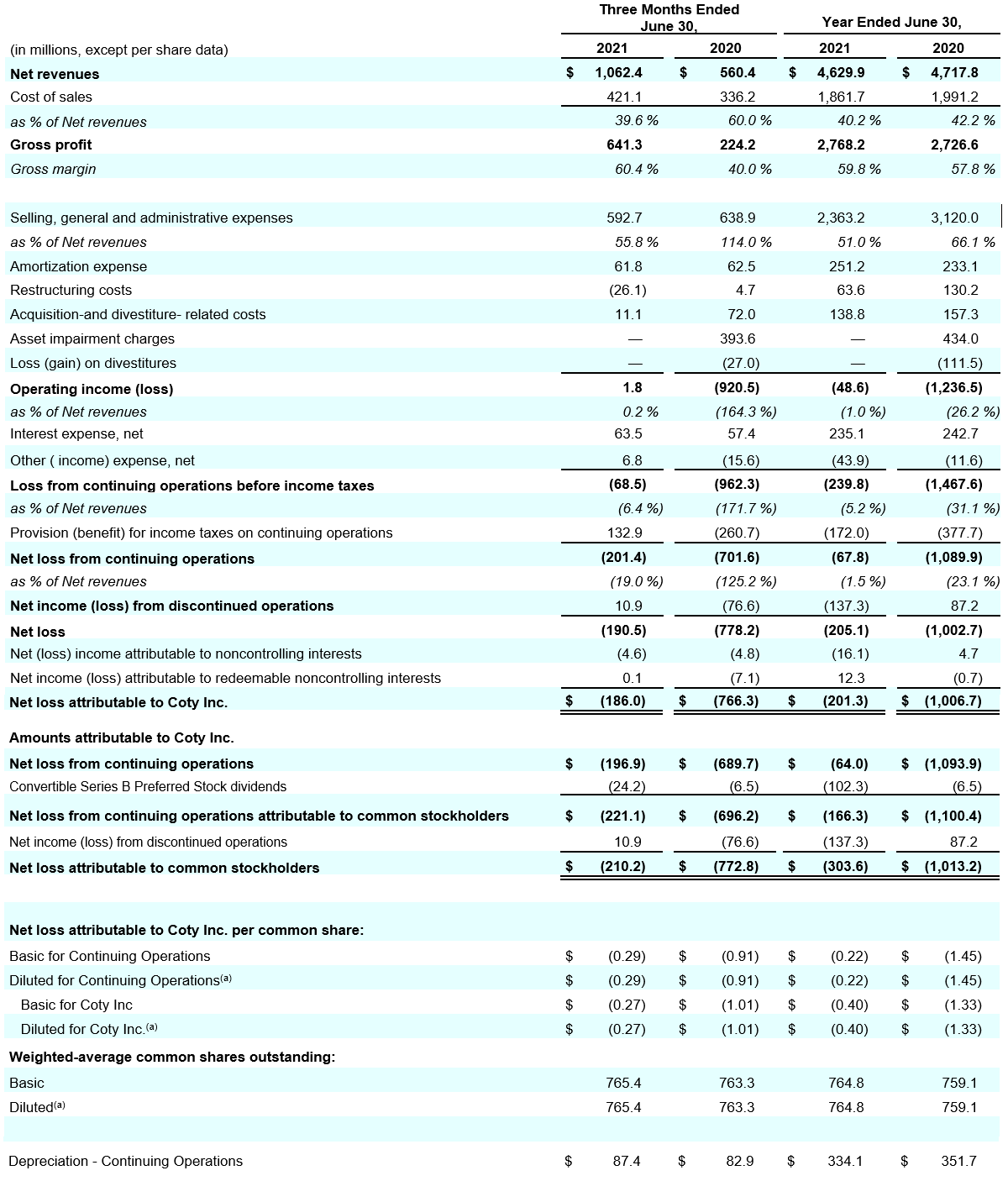
(a) Diluted EPS is adjusted by the effect of dilutive securities, including awards under our equity compensation plans and the convertible Series B Preferred Stock. We use the if-converted method for calculating any potential dilutive effect of the convertible Series B Preferred Stock, which requires an adjustment to reverse the impact of the preferred stock dividends, including deemed dividends, of $24.2 million and $102.3 million on income applicable to common stockholders during three and twelve months ended June 30, 2021.
RECONCILIATION OF REPORTED TO ADJUSTED RESULTS FOR THE CONSOLIDATED STATEMENTS OF OPERATIONS
These supplemental schedules provide adjusted Non-GAAP financial information and a quantitative reconciliation of the difference between the Non-GAAP financial measure and the financial measure calculated and reported in accordance with GAAP.
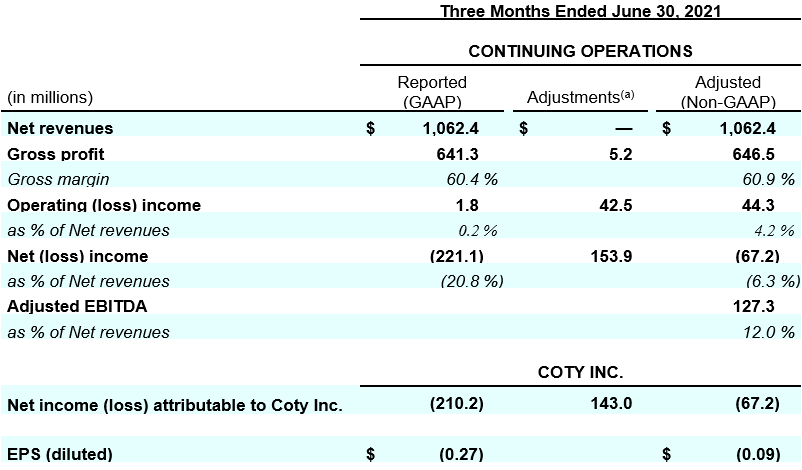
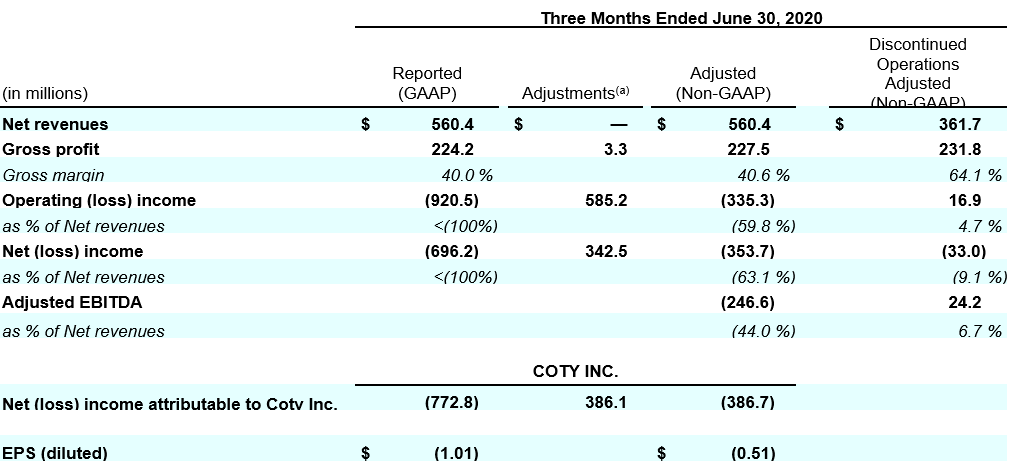
(a) See “Reconciliation of Reported Operating (Loss) Income to Adjusted Operated Income” and “Reconciliation of Reported Net (Loss) Income to Adjusted Net Income” for a detailed description of adjusted items.
RECONCILIATION OF REPORTED TO ADJUSTED RESULTS FOR THE CONSOLIDATED STATEMENTS OF OPERATIONS
These supplemental schedules provide adjusted Non-GAAP financial information and a quantitative reconciliation of the difference between the Non-GAAP financial measure and the financial measure calculated and reported in accordance with GAAP.
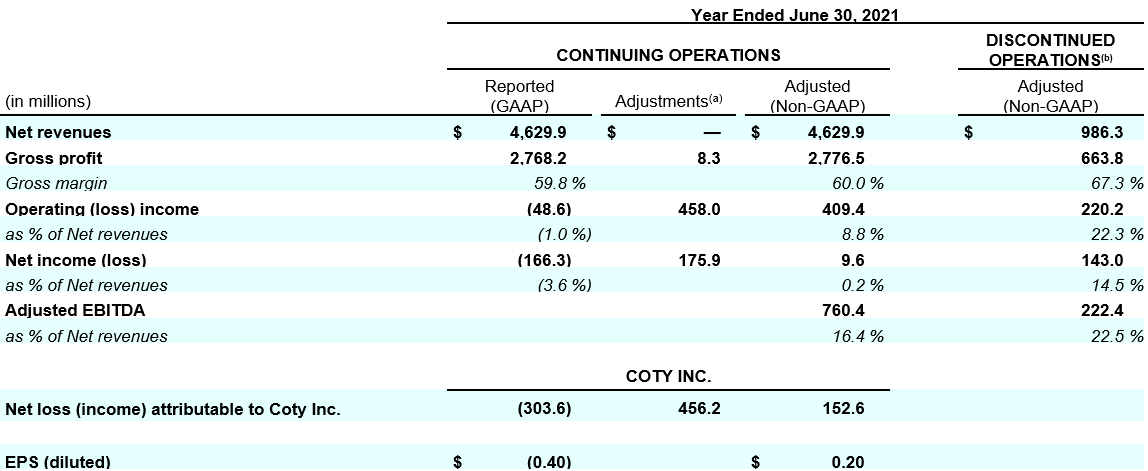
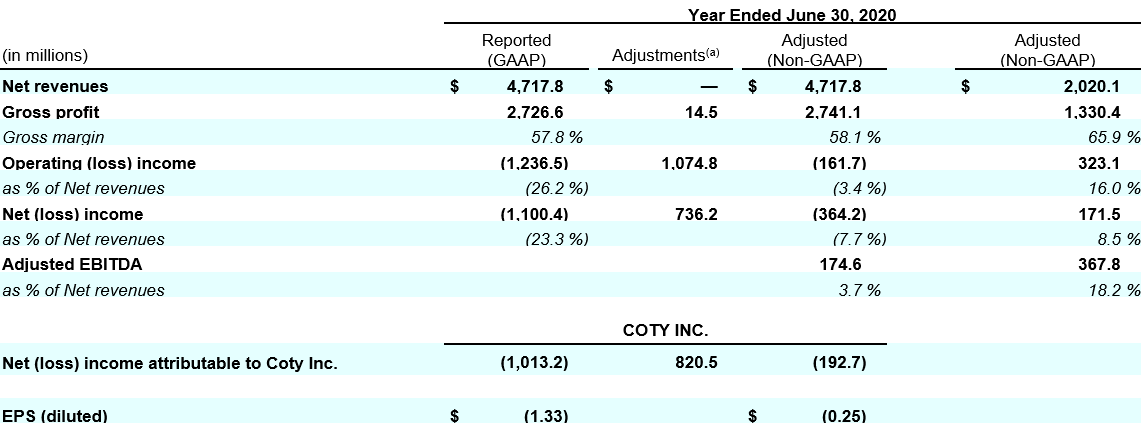
(a) See “Reconciliation of Reported Operating (Loss) Income to Adjusted Operated Income” and “Reconciliation of Reported Net (Loss) Income to Adjusted Net Income” for a detailed description of adjusted items.
In the six months ended December 31, 2020, amortization expense increased to $127.2 from $109.1 in the six months ended December 31, 2019. In the six months ended December 31, 2020, amortization expense of $51.4, $63.2 and $12.6 was reported in the Americas, EMEA and Asia Pacific segments, respectively. In the six months ended December 31, 2019, amortization expense of $25.5, $63.7, $12.5 and $7.4 was reported in the Americas, EMEA, Asia Pacific and Other segments, respectively.
(b) Discontinued operations for the fiscal year 2021 includes activity only through November 30, 2020, the date of the sale of the Wella Business.
RECONCILIATION OF REPORTED OPERATING (LOSS) INCOME TO ADJUSTED OPERATING INCOME (LOSS) AND ADJUSTED EBITDA
CONTINUING OPERATIONS
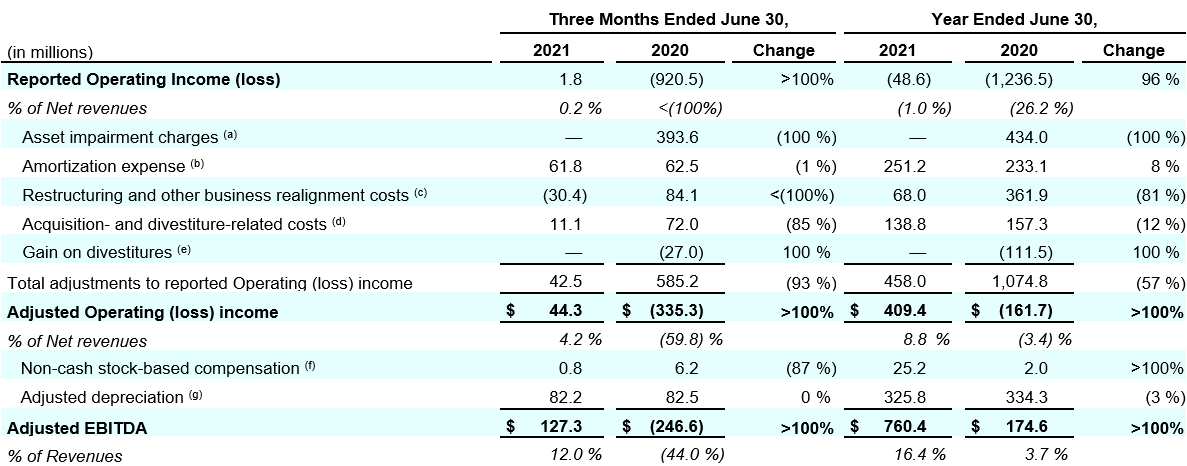
(a) In the three months ended June 30, 2021, we did not incur any asset impairment charges. In the three months ended June 30, 2020, we incurred asset impairment charges of $393.6 primarily due to other indefinite-lived intangible assets in Corporate, and goodwill in the EMEA segment.
In fiscal 2021, we did not incur any asset impairment charges. In fiscal 2020, we incurred asset impairment charges of $434.0 primarily due to other indefinite-lived intangible assets in Corporate, and goodwill in the EMEA segment.
(b) In the three months ended June 30, 2021, amortization expense of $26.8, $29.3 and $5.7 was reported in the Americas, EMEA and Asia Pacific segments, respectively. In the three months ended June 30, 2020, amortization expense of $25.6, $30.6 and $6.3 was reported in the Americas, EMEA and Asia Pacific segments, respectively.
In fiscal 2021, amortization expense of $105.0, $122.1 and $24.1 was reported in the Americas, EMEA and Asia Pacific segments, respectively. In fiscal 2020, amortization expense of $75.3, $125.4, $25.0, and $7.4 was reported in the Americas, EMEA, Asia Pacific and Other segments, respectively.
(c) In the three months ended June 30, 2021, we incurred restructuring and other business structure realignment costs of $(30.4). We incurred restructuring costs of $(26.1) primarily related to the Transformation Plan, included in the Condensed Consolidated Statements of Operations; and business structure realignment costs of $(4.3) primarily related to the Transformation Plan and certain other programs. This amount includes $(9.5) reported in selling, general and administrative expenses, and $5.2 reported in cost of sales in the Condensed Consolidated Statement of Operations. In the three months ended June 30, 2020, we incurred restructuring and other business structure realignment costs of $84.1. We incurred restructuring costs of $4.7 primarily related to the Transformation Plan, included in the Condensed Consolidated Statements of Operations; and business structure realignment costs of $79.4 primarily related to the Global Integration Activities and our Transformation Plan. This amount includes $76.1 reported in selling, general and administrative expenses, and $3.3 reported in cost of sales in the Condensed Consolidated Statement of Operations.
In fiscal 2021, we incurred restructuring and other business structure realignment costs of $68.0. We incurred restructuring costs of $63.6 primarily for charges related to the Transformation Plan, included in the Condensed Consolidated Statements of Operations; and business structure realignment costs of $4.4 primarily related to the Transformation Plan and certain other programs. This amount includes $(3.9) reported in selling, general and administrative expenses, and $8.3 reported in cost of sales in the Condensed Consolidated Statement of Operations. In fiscal 2020, we incurred restructuring and other business structure realignment costs of $361.9. We incurred restructuring costs of $130.2 primarily related to the Transformation Plan, included in the Condensed Consolidated Statements of Operations; and business structure realignment costs of $231.7 primarily related to our Global Integration Activities and Transformation Plan. This amount includes $217.2 reported in selling, general and administrative expenses, and $14.5 reported in cost of sales in the Condensed Consolidated Statement of Operations.
(d) In the three months ended June 30, 2021, we incurred acquisition and divestiture related costs of $11.1. These costs were principally associated with the Wella Transaction. In the three months ended June 30, 2020, we incurred acquisition and divestiture related costs of $72.0.
In fiscal 2021, we incurred acquisition and divestiture related costs of $138.8. These costs were principally associated with the Wella Transaction. In fiscal 2020, we incurred acquisition and divestiture related costs of $157.3.
(e) In the three months ended June 30, 2021, there were no gains on divestitures. In the three months ended June 30, 2020, as a result of the divestiture of Younique in the first quarter, we recorded income of $27.0 included in Gain on sale of business in the Condensed Consolidated Statements of Operations.
In fiscal 2021, there were no gains on divestitures. In fiscal 2020, we completed the divestiture of Younique resulting in income of $111.5 included in Gain on sale of business in the Condensed Consolidated Statements of Operations.
(f) In the three months ended June 30, 2021, non-cash stock-based compensation of $0.3, $0.4 and $0.1 was reported in the Americas, EMEA and Asia Pacific segments, respectively. In the three months ended June 30, 2020, non-cash stock-based compensation of $2.9, $2.3 and $1.0 was reported in the Americas, EMEA and Asia Pacific segments, respectively.
In fiscal 2021, non-cash stock-based compensation of $10.2, $11.9 and $3.1 was reported in the Americas, EMEA and Asia Pacific segments, respectively. In fiscal 2020, non-cash stock-based compensation of $0.8, $1.0 and $0.2 was reported in the Americas, EMEA and Asia Pacific segments, respectively.
(g) In the three months ended June 30, 2021, adjusted depreciation expense of $37.8, $32.4 and $12.0 was reported in the Americas, EMEA and Asia Pacific segments, respectively. In the three months ended June 30, 2020, adjusted depreciation expense of $41.0, $29.3 and $12.2 was reported in the Americas, EMEA and Asia Pacific segments, respectively.
In fiscal 2021, adjusted depreciation expense of $147.3, $134.0 and $44.5 was reported in the Americas, EMEA and Asia Pacific segments, respectively. In fiscal 2020, adjusted depreciation expense of $145.5, $142.0, $42.5 and $4.3 was reported in the Americas, EMEA, Asia Pacific and Other segments, respectively.
RECONCILIATION OF REPORTED INCOME (LOSS) BEFORE INCOME TAXES AND EFFECTIVE TAX RATES TO ADJUSTED INCOME (LOSS) BEFORE INCOME TAXES AND ADJUSTED EFFECTIVE TAX RATES FOR CONTINUING OPERATIONS

The adjusted effective tax rate was (26.0%) for the three months ended June 30, 2021 compared to 9.9% for the three months ended June 30, 2020. The difference was primarily due to the jurisdictional mix of income.
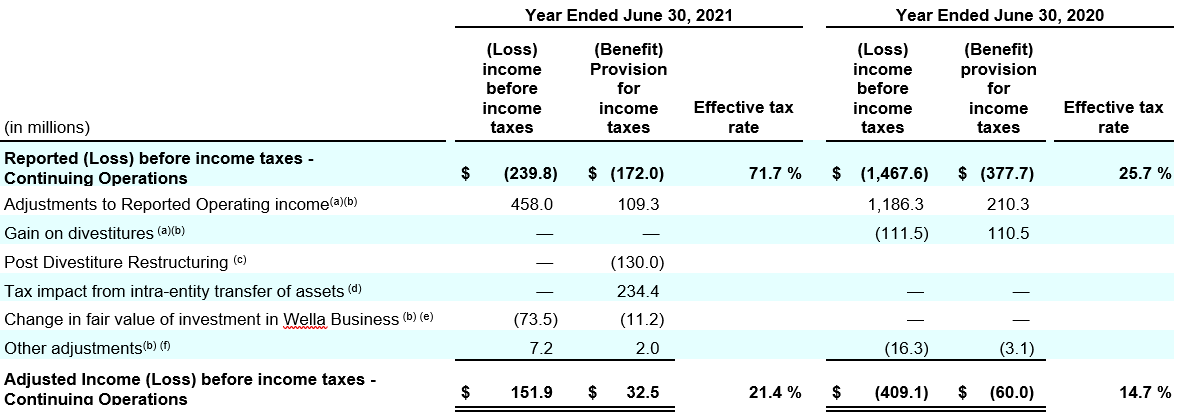
(a) See a description of adjustments under “Adjusted Operating (Loss) Income for Continuing Operations.”
(b) The tax effects of each of the items included in adjusted income are calculated in a manner that results in a corresponding income tax benefit/provision for adjusted income. In preparing the calculation, each adjustment to reported income is first analyzed to determine if the adjustment has an income tax consequence. The provision for taxes is then calculated based on the jurisdiction in which the adjusted items are incurred, multiplied by the respective statutory rates and offset by the increase or reversal of any valuation allowances commensurate with the non-GAAP measure of profitability.
(c) Tax expense relates to an internal restructuring following the Wella divestiture, primarily intended to create a more efficient structure to hold its remaining 40% equity investment in Wella.
(d) Tax benefit of $234.4 is the result of a tax rate differential on the deferred taxes recognized on the transfer of assets and liabilities, following the relocation of our main principal location from Geneva to Amsterdam in first fiscal quarter. The overall value of the assets and liabilities transferred was negotiated with both the Swiss and Dutch Tax Authorities and per terms of the agreements, will be reevaluated after three years.
(e) The amount represents the unrealized (gain) loss recognized for the change in the fair value of the investment in Wella.
(f) For the three months ended June 30, 2021, this primarily represents adjustments for pension curtailment gains. For the year ended June 30, 2021, this primarily represents the write-off of deferred financing fees related to the Wella sale and adjustments for pension curtailment gains.
RECONCILIATION OF REPORTED NET INCOME (LOSS) TO ADJUSTED NET INCOME (LOSS) FOR CONTINUING OPERATIONS
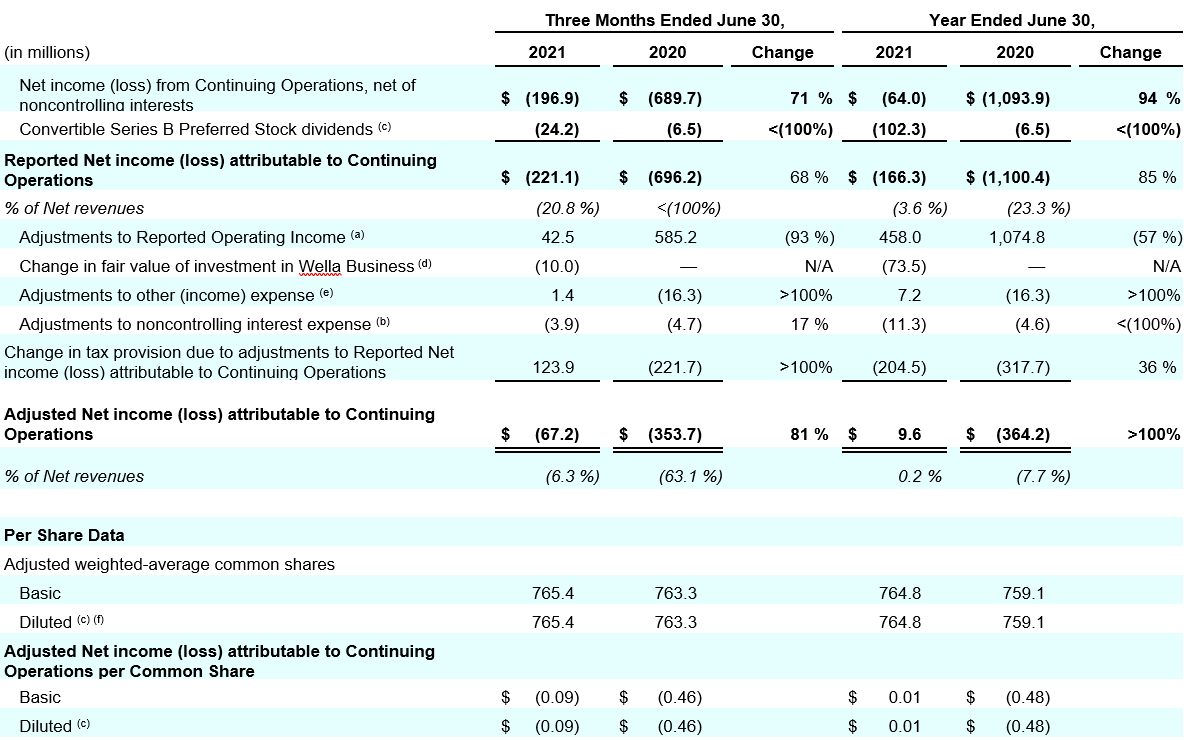
(a) See a description of adjustments under “Adjusted Operating Income (loss) for Continuing Operations.”
(b) The amounts represent the after-tax impact of the non-GAAP adjustments included in Net income attributable to noncontrolling interest based on the relevant noncontrolling interest percentage in the Condensed Consolidated Statements of Operations.
(c) Diluted EPS is adjusted by the effect of dilutive securities, including awards under our equity compensation plans and the convertible Series B Preferred Stock. We use the if-converted method for calculating any potential dilutive effect of the convertible Series B Preferred Stock, which requires an adjustment to reverse the impact of the preferred stock dividends, including deemed dividends, of $24.2 million and $102.3 million for the three and twelve months ended June 30, 2021 on income applicable to common stockholders during the period.
(d) The amount represents the unrealized (gain) loss recognized for the change in the fair value of the investment in Wella.
(e) For the three months ended June 30, 2021, this primarily represents adjustments for pension curtailment gains. For the year ended June 30, 2021, this primarily represents the write-off of deferred financing fees related to the Wella sale and adjustments for pension curtailment gains.
(f) As of June 30 2021, 171.1 million shares of outstanding stock options and Series A/A-1 Preferred Stock with purchase or conversion rights to purchase shares of Common Stock, RSUs and Convertible Series B Preferred Stock were excluded in the computation of adjusted weighted-average diluted shares because their effect would be anti-dilutive.
RECONCILIATION OF REPORTED NET INCOME (LOSS) TO ADJUSTED NET INCOME (LOSS) FOR COTY INC.

(a) See a description of adjustments under “Adjusted Operating Income (loss) for Coty Inc.”
(b) The amounts represent the after-tax impact of the non-GAAP adjustments included in Net income attributable to noncontrolling interest based on the relevant noncontrolling interest percentage in the Condensed Consolidated Statements of Operations.
(c) Diluted EPS is adjusted by the effect of dilutive securities, including awards under our equity compensation plans and the convertible Series B Preferred Stock. We use the if-converted method for calculating any potential dilutive effect of the convertible Series B Preferred Stock, which requires an adjustment to reverse the impact of the preferred stock dividends, including deemed dividends, of $24.2 million and $102.3 million for the three and twelve months ended June 30, 2021, respectively, on income applicable to common stockholders during the period.
(d) The amount represents the unrealized (gain) loss recognized for the change in the fair value of the investment in Wella.
(e) For the three months ended June 30, 2021, this primarily represents adjustments for pension curtailment gains. For the year ended June 30, 2021, this primarily represents the write-off of deferred financing fees related to the Wella sale and adjustments for pension curtailment gains.
(f) As of June 30 2021, 171.1 million shares of outstanding stock options and Series A/A-1 Preferred Stock with purchase or conversion rights to purchase shares of Common Stock, RSUs and Convertible Series B Preferred Stock were excluded in the computation of adjusted weighted-average diluted shares because their effect would be anti-dilutive.
RECONCILIATION OF NET CASH PROVIDED BY OPERATING ACTIVITIES TO FREE CASH FLOW
COTY INC.

RECONCILIATION OF TOTAL DEBT TO ECONOMIC NET DEBT
COTY INC.

IMMEDIATE LIQUIDITY
COTY INC.

RECONCILIATION OF ADJUSTED OPERATING INCOME (LOSS) TO ADJUSTED EBITDA

(a) For a reconciliation of adjusted operating income (loss) to operating income (loss) for each of those periods, see the tables entitled “Reconciliation of Reported Operating Income (loss) to Adjusted Operating Income (loss)” and "Reconciliation of Reported Operating Income (loss) to Adjusted Operating Income (loss) by Segment" for each of those periods.
(b) Adjusted depreciation for the twelve months ended June 30, 2021 represents depreciation expense for continuing operations for the period, excluding accelerated depreciation.
FINANCIAL NET DEBT/ADJUSTED EBITDA

RECONCILIATION OF REPORTED NET REVENUES TO LIKE-FOR-LIKE NET REVENUES
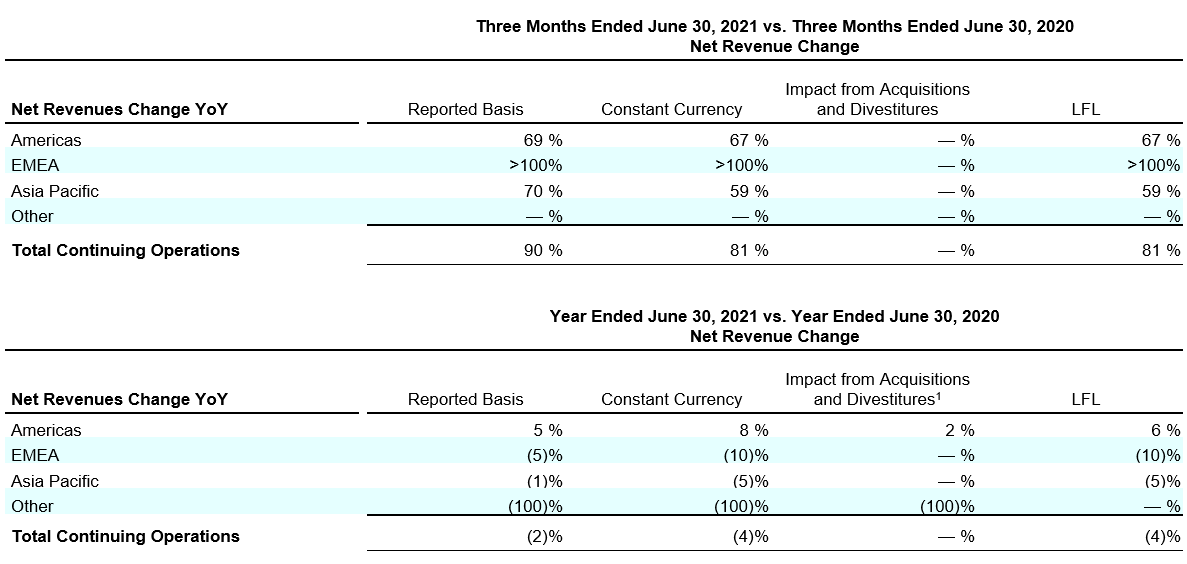
1 Like for Like (LFL) impact excludes the net revenue contribution from King Kylie for the first and second quarters of fiscal 2021 (due to the acquisition of King Kylie during the third quarter of fiscal 2020), and the net revenues of Younique for the twelve months ended June 30, 2020 (due to the divestiture of Younique the first quarter of fiscal 2020).
COTY INC. & SUBSIDIARIES
CONDENSED CONSOLIDATED BALANCE SHEETS
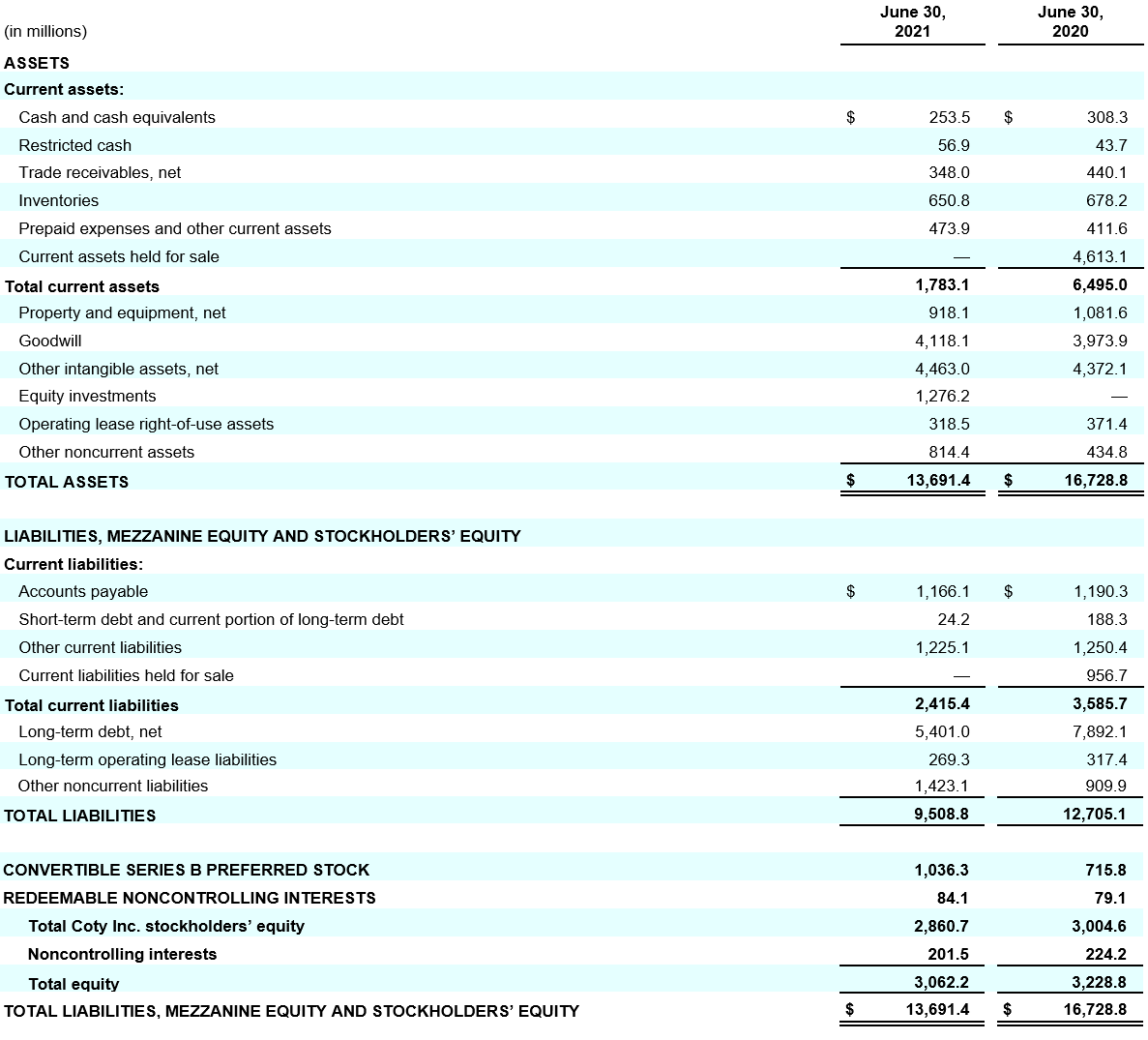
COTY INC. & SUBSIDIARIES
CONDENSED CONSOLIDATED STATEMENTS OF CASH FLOWS
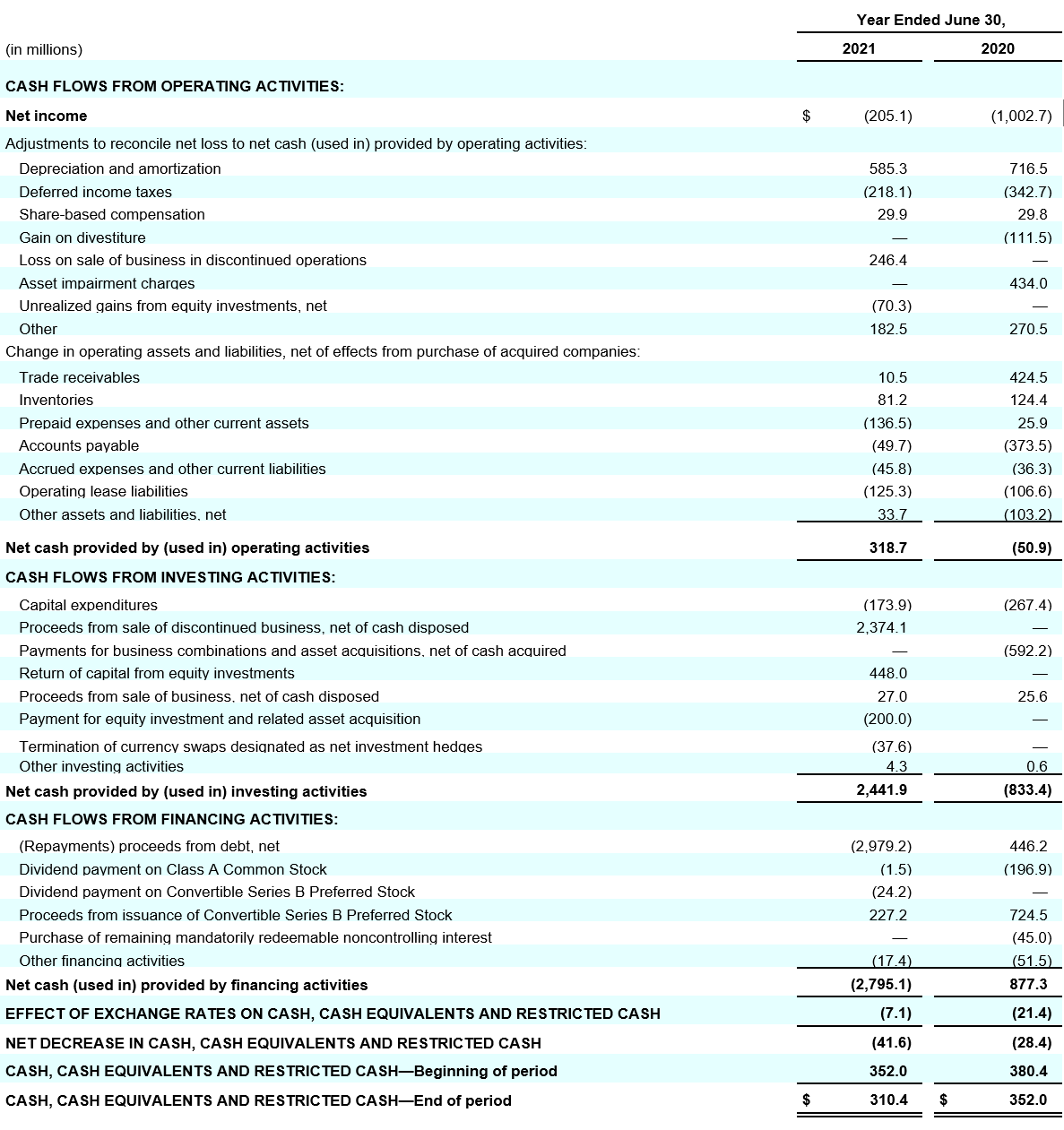
About Coty Inc.
Coty is one of the world’s largest beauty companies with an iconic portfolio of brands across fragrance, color cosmetics, and skin and body care. Coty is the global leader in fragrance, and number three in color cosmetics. Coty’s products are sold in over 130 countries around the world. Coty and its brands are committed to a range of social causes as well as seeking to minimize its impact on the environment. For additional information about Coty Inc., please visit www.coty.com.
Forward Looking Statements
Certain statements in this Earnings Release are “forward-looking statements” within the meaning of the Private Securities Litigation Reform Act of 1995. These forward-looking statements reflect the Company's current views with respect to, among other things, the impact of COVID-19 and potential recovery scenarios, strategic planning, targets, segment reporting and outlook for future reporting periods (including the extent, timing and concentration of revenue, expense and profit trends and changes in operating cash flows and cash flows from operating activities and investing activities, and expected drivers of sales and profitability in future periods), the impact of the sale of the Wella Business and the related transition services (the “Wella TSA”), the Company’s future operations and strategy (including the expected implementation and related impact of its strategic priorities), ongoing and future cost efficiency, optimization and restructuring initiatives and programs, strategic transactions (including their expected timing and impact), plans with respect to opportunities to leverage assets including through public offerings, the Company’s capital allocation strategy and payment of dividends (including suspension of dividend payments and the duration thereof and any plans to resume cash dividends on common stock or to continue to pay dividends in cash on preferred stock), investments, licenses and portfolio changes, product launches, relaunches or rebranding (including the expected timing or impact thereof) synergies, savings, performance, cost, timing and integration of acquisitions and investments, including the strategic partnership with Kylie Jenner and the strategic partnership with Kim Kardashian West, future cash flows, liquidity and borrowing capacity, timing and size of cash outflows and debt deleveraging, future debt covenant compliance, the timing and extent of any future impairments, and synergies, savings, impact, cost, timing and implementation of the Company’s comprehensive transformation agenda (the "Transformation Plan"), including operational and organizational structure changes, operational execution and simplification initiatives, cost reductions, supply chain changes, e-commerce and digital initiatives, and the priorities of senior management. These forward-looking statements are generally identified by words or phrases, such as “anticipate”, “are going to”, “estimate”, “plan”, “project”, “expect”, “believe”, “intend”, “foresee”, “forecast”, “will”, “may”, “should”, “outlook”, “continue”, “temporary”, “target”, “aim”, “potential”, “goal” and similar words or phrases. These statements are based on certain assumptions and estimates that we consider reasonable, but are subject to a number of risks and uncertainties, many of which are beyond our control, which could cause actual events or results (including our financial condition, results of operations, cash flows and prospects) to differ materially from such statements, including risks and uncertainties relating to:
- the impact of COVID-19 (or future similar events), including demand for the Company’s products, illness, quarantines, government actions, facility closures, store closures or other restrictions in connection with the COVID-19 pandemic, and the extent and duration thereof, the availability and widespread distribution of a safe and effective vaccine, related impact on the Company's ability to meet customer needs and on the ability of third parties on which the Company relies, including its suppliers, customers, contract manufacturers, distributors, contractors, commercial banks and joint-venture partners, to meet their obligations to the Company, in particular collections from customers, the extent that government funding and reimbursement programs in connection with COVID-19 are available to the Company, and the ability to successfully implement measures to respond to such impacts;
- the Company’s ability to successfully implement its multi-year Transformation Plan, including its management realignment, reporting structure changes, operational and organizational changes, and the initiatives to further reduce the Company’s cost base, and to develop and achieve its global business strategies (including mix management, select price increases, more disciplined promotions, and foregoing low value sales), compete effectively in the beauty industry, achieve the benefits contemplated by its strategic initiatives (including revenue growth, cost control, gross margin growth and debt deleveraging) and successfully implement its strategic priorities (including innovation performance in prestige and mass channels, strengthening its positions in core markets, accelerating its digital and e-commerce capabilities, building on its skincare portfolio, and expanding its presence in China) in each case within the expected time frame or at all;
- the Company’s ability to anticipate, gauge and respond to market trends and consumer preferences, which may change rapidly, and the market acceptance of new products, including new products related to Kylie Jenner’s or Kim Kardashian West’s existing beauty business, any relaunched or rebranded products and the anticipated costs and discounting associated with such relaunches and rebrands, and consumer receptiveness to our current and future marketing philosophy and consumer engagement activities (including digital marketing and media);
- use of estimates and assumptions in preparing the Company’s financial statements, including with regard to revenue recognition, income taxes (including the expected timing and amount of the release of any tax valuation allowance), the assessment of goodwill, other intangible and long-lived assets for impairments, the market value of inventory, the fair value of the equity investment, and the fair value of acquired assets and liabilities associated with acquisitions;
- the impact of any future impairments;
- managerial, transformational, operational, regulatory, legal and financial risks, including diversion of management attention to and management of cash flows, expenses and costs associated with the Company's response to COVID-19, the Transformation Plan, the Wella TSA, the integration of the King Kylie transaction and the KKW transaction, opportunities to leverage assets including through public offerings, and future strategic initiatives, and, in particular, the Company's ability to manage and execute many initiatives simultaneously including any resulting complexity, employee attrition or diversion of resources;
- the timing, costs and impacts of divestitures and the amount and use of proceeds from any such transactions;
- future divestitures and the impact thereof on, and future acquisitions, new licenses and joint ventures and the integration thereof with, our business, operations, systems, financial data and culture and the ability to realize synergies, avoid future supply chain and other business disruptions, reduce costs (including through the Company’s cash efficiency initiatives), avoid liabilities and realize potential efficiencies and benefits (including through our restructuring initiatives) at the levels and at the costs and within the time frames contemplated or at all;
- increased competition, consolidation among retailers, shifts in consumers’ preferred distribution and marketing channels (including to digital and prestige channels), distribution and shelf-space resets or reductions, compression of go-to-market cycles, changes in product and marketing requirements by retailers, reductions in retailer inventory levels and order lead-times or changes in purchasing patterns, impact from COVID-19 on retail revenues, and other changes in the retail, e-commerce and wholesale environment in which the Company does business and sells its products and the Company’s ability to respond to such changes (including its ability to expand its digital, direct-to-consumer and e-commerce capabilities within contemplated timeframes or at all);
- the Company and its joint ventures’, business partners’ and licensors’ abilities to obtain, maintain and protect the intellectual property used in its and their respective businesses, protect its and their respective reputations (including those of its and their executives or influencers), public goodwill, and defend claims by third parties for infringement of intellectual property rights, and specifically in connection with the strategic partnerships with Kylie Jenner and Kim Kardashian West, risks related to the entry into a new distribution channel, the potential for channel conflict, risks of retaining customers and key employees, difficulties of integration (or the risks associated with limiting integration), ability to protect trademarks and brand names, litigation or investigations by governmental authorities, and changes in law, regulations and policies that affect KKW Holdings, LLC’s (“KKW Holdings”) business or products, including risk that direct selling laws and regulations may be modified, interpreted or enforced in a manner that results in a negative impact to KKW Holdings’ business model, revenue, sales force or business;
- any change to the Company’s capital allocation and/or cash management priorities, including any change in the Company’s dividend policy or, if the Company's Board declares dividends on its common stock, the Company’s stock dividend reinvestment program;
- any unanticipated problems, liabilities or integration or other challenges associated with a past or future acquired business, joint ventures or strategic partnerships which could result in increased risk or new, unanticipated or unknown liabilities, including with respect to environmental, competition and other regulatory, compliance or legal matters;
- the Company’s international operations and joint ventures, including enforceability and effectiveness of its joint venture agreements and reputational, compliance, regulatory, economic and foreign political risks, including difficulties and costs associated with maintaining compliance with a broad variety of complex local and international regulations;
- the Company’s dependence on certain licenses (especially in the fragrance category) and the Company’s ability to renew expiring licenses on favorable terms or at all;
- the Company’s dependence on entities performing outsourced functions, including outsourcing of distribution functions, and third-party manufacturers, logistics and supply chain suppliers, and other suppliers, including third-party software providers, web-hosting and e-commerce providers;
- administrative, product development and other difficulties in meeting the expected timing of market expansions, product launches, re-launches and marketing efforts, including in connection with new products related to Kylie Jenner’s or Kim Kardashian West’s existing beauty businesses;
- global political and/or economic uncertainties, disruptions or major regulatory or policy changes, and/or the enforcement thereof that affect the Company’s business, financial performance, operations or products, including the impact of Brexit (and related business or market disruption), the current U.S. administration and recent election, changes in the U.S. tax code, and recent changes and future changes in tariffs, retaliatory or trade protection measures, trade policies and other international trade regulations in the U.S., the European Union and Asia and in other regions where the Company operates;
- currency exchange rate volatility and currency devaluation;
- the number, type, outcomes (by judgment, order or settlement) and costs of current or future legal, compliance, tax, regulatory or administrative proceedings, investigations and/or litigation, including litigation relating to the tender offer by Cottage Holdco B.V. (the “Cottage Tender Offer”) and product liability cases (including asbestos and talc-related litigation for which indemnities and/or insurance are not available), and litigation or investigations relating to the strategic partnerships with Kylie Jenner and Kim Kardashian West;
- the Company’s ability to manage seasonal factors and other variability and to anticipate future business trends and needs;
- disruptions in operations, sales and in other areas, including due to disruptions in our supply chain, restructurings and other business alignment activities, the Wella Transaction and related carve-out and transition activities, manufacturing or information technology systems, labor disputes, extreme weather and natural disasters, impact from COVID-19 or similar global public health events, and the impact of such disruptions on the Company’s ability to generate profits, stabilize or grow revenues or cash flows, comply with its contractual obligations and accurately forecast demand and supply needs and/or future results;
- restrictions imposed on the Company through its license agreements, credit facilities and senior unsecured bonds or other material contracts, its ability to generate cash flow to repay, refinance or recapitalize debt and otherwise comply with its debt instruments, and changes in the manner in which the Company finances its debt and future capital needs;
- increasing dependency on information technology, including as a result of remote working in response to COVID-19, and the Company’s ability to protect against service interruptions, data corruption, cyber-based attacks or network security breaches, including ransomware attacks, costs and timing of implementation and effectiveness of any upgrades or other changes to information technology systems, and the cost of compliance or the Company’s failure to comply with any privacy or data security laws (including the European Union General Data Protection Regulation, the California Consumer Privacy Act and the Brazil General Data Protection Law) or to protect against theft of customer, employee and corporate sensitive information;
- the Company's ability to attract and retain key personnel and the impact of senior management transitions and organizational structure changes;
- the distribution and sale by third parties of counterfeit and/or gray market versions of the Company’s products;
- the impact of the Transformation Plan as well as the Wella Transaction on the Company’s relationships with key customers and suppliers and certain material contracts;
- the Company’s relationship with Cottage Holdco B.V., as the Company’s majority stockholder, and its affiliates, and any related conflicts of interest or litigation;
- the Company’s relationship with KKR, whose affiliates KKR Rainbow Aggregator L.P. and KKR Bidco are respectively a significant stockholder in Coty and an investor in the Wella Business, and any related conflicts of interest or litigation;
- future sales of a significant number of shares by the Company’s majority stockholder or the perception that such sales could occur; and
- other factors described elsewhere in this document and in documents that the Company files with the SEC from time to time.
When used herein, the term “includes” and “including” means, unless the context otherwise indicates, “including without limitation”. More information about potential risks and uncertainties that could affect the Company’s business and financial results is included under the heading “Risk Factors” and “Management’s Discussion and Analysis of Financial Condition and Results of Operations” in the Company’s Quarterly Report on Form 10-Q for the period ended March 31, 2021 and annual report on Form 10-K for the year ended June 30, 2021 and other periodic reports the Company has filed and may file with the SEC from time to time.
All forward-looking statements made in this release are qualified by these cautionary statements. These forward-looking statements are made only as of the date of this release, and the Company does not undertake any obligation, other than as may be required by applicable law, to update or revise any forward-looking or cautionary statements to reflect changes in assumptions, the occurrence of events, unanticipated or otherwise, or changes in future operating results over time or otherwise.
Comparisons of results for current and any prior periods are not intended to express any future trends or indications of future performance unless expressed as such, and should only be viewed as historical data.
Non-GAAP Financial Measures
The Company operates on a global basis, with the majority of net revenues generated outside of the U.S. Accordingly, fluctuations in foreign currency exchange rates can affect results of operations. Therefore, to supplement financial results presented in accordance with GAAP, certain financial information is presented excluding the impact of foreign currency exchange translations to provide a framework for assessing how the underlying businesses performed excluding the impact of foreign currency exchange translations (“constant currency”). Constant currency information compares results between periods as if exchange rates had remained constant period-over-period, with the current period’s results calculated at the prior-year period’s rates. The Company calculates constant currency information by translating current and prior-period results for entities reporting in currencies other than U.S. dollars into U.S. dollars using constant foreign currency exchange rates. The constant currency calculations do not adjust for the impact of revaluing specific transactions denominated in a currency that is different to the functional currency of that entity when exchange rates fluctuate. The constant currency information presented may not be comparable to similarly titled measures reported by other companies. The Company discloses the following constant currency financial measures: net revenues, like-for-like (LFL) net revenues, adjusted gross profit and adjusted operating income.
The Company presents period-over-period comparisons of net revenues on a constant currency basis as well as on an (LFL) basis. The Company believes that (LFL) better enables management and investors to analyze and compare the Company's net revenues performance from period to period. For the periods described in this release, the term “like-for-like” describes the Company's core operating performance, excluding the financial impact of (i) acquired brands or businesses in the current year period until we have twelve months of comparable financial results, (ii) the divested brands or businesses or early terminated brands, generally, in the prior year non-comparable periods, to maintain comparable financial results with the current fiscal year period and (iii) foreign currency exchange translations to the extent applicable. For a reconciliation of (LFL) period-over-period, see the table entitled “Reconciliation of Reported Net Revenues to Like-For-Like Net Revenues”.
The Company presents operating income, operating income margin, gross profit, gross margin, effective tax rate, net income, net income margin, net revenues, EBITDA, and EPS (diluted) on a non-GAAP basis and specifies that these measures are non-GAAP by using the term “adjusted” (collectively the Adjusted Performance Measures). The reconciliations of these non-GAAP financial measures to the most directly comparable financial measures calculated and presented in accordance with GAAP are shown in tables below. These non-GAAP financial measures should not be considered in isolation from, or as a substitute for or superior to, financial measures reported in accordance with GAAP. Moreover, these non-GAAP financial measures have limitations in that they do not reflect all the items associated with the operations of the business as determined in accordance with GAAP. Other companies, including companies in the beauty industry, may calculate similarly titled non-GAAP financial measures differently than we do, limiting the usefulness of those measures for comparative purposes.
Adjusted operating income/Adjusted EBITDA from continuing operations excludes restructuring costs and business structure realignment programs, amortization, acquisition- and divestiture-related costs and acquisition accounting impacts, asset impairment charges and other adjustments as described below. For adjusted EBITDA, in addition to the preceding, we adjust for non-cash stock-based compensation expense and depreciation. We do not consider these items to be reflective of our core operating performance due to the variability of such items from period-to-period in terms of size, nature and significance. They are primarily incurred to realign our operating structure and integrate new acquisitions, and implement divestitures of components of our business, and fluctuate based on specific facts and circumstances. Additionally, Adjusted net income attributable to Coty Inc. and Adjusted net income attributable to Coty Inc. per common share are adjusted for certain interest and other (income) expense as described below and the related tax effects of each of the items used to derive Adjusted net income as such charges are not used by our management in assessing our operating performance period-to-period.
Adjusted Performance Measures reflect adjustments based on the following items:
- Costs related to acquisition and divestiture activities: The Company excludes acquisition- and divestiture-related costs and the accounting impacts such as those related to transaction costs and costs associated with the revaluation of acquired inventory in connection with business combinations because these costs are unique to each transaction. Additionally, for divestitures, the Company excludes write-offs of assets that are no longer recoverable and contract related costs due to the divestiture. The nature and amount of such costs vary significantly based on the size and timing of the acquisitions and divestitures, and the maturities of the businesses being acquired or divested. Also, the size, complexity and/or volume of past transactions, which often drives the magnitude of such expenses, may not be indicative of the size, complexity and/or volume of any future acquisitions or divestitures.
- Restructuring and other business realignment costs: The Company excludes costs associated with restructuring and business structure realignment programs to allow for comparable financial results to historical operations and forward-looking guidance. In addition, the nature and amount of such charges vary significantly based on the size and timing of the programs. By excluding the referenced expenses from the non-GAAP financial measures, management is able to further evaluate the Company’s ability to utilize existing assets and estimate their long-term value. Furthermore, management believes that the adjustment of these items supplement the GAAP information with a measure that can be used to assess the sustainability of the Company’s operating performance.
- Asset impairment charges: The Company excludes the impact of asset impairments as such non-cash amounts are inconsistent in amount and frequency and are significantly impacted by the timing and/or size of acquisitions. Our management believes that the adjustment of these items supplement the GAAP information with a measure that can be used to assess the sustainability of our operating performance.
- Amortization expense: We have excluded the impact of amortization of finite-lived intangible assets, as such non-cash amounts are inconsistent in amount and frequency and are significantly impacted by the timing and/or size of acquisitions. Our management believes that the adjustment of these items supplement the GAAP information with a measure that can be used to assess the sustainability of our operating performance. Although we exclude amortization of intangible assets from our non-GAAP expenses, our management believes that it is important for investors to understand that such intangible assets contribute to revenue generation. Amortization of intangible assets that relate to past acquisitions will recur in future periods until such intangible assets have been fully amortized. Any future acquisitions may result in the amortization of additional intangible assets.
- Loss/(Gain) on divestitures: The Company excludes the impact of Loss/(gain) on divestitures as such amounts are inconsistent in amount and frequency and are significantly impacted by the size of divestitures. Our management believes that the adjustment of these items supplement the GAAP information with a measure that can be used to assess the sustainability of our operating performance.
- Non-cash stock-based compensation: Although non-cash stock-based compensation is a key incentive offered to our employees, we have excluded the effect of these expenses from the calculation of adjusted EBITDA. This is primarily due to their non-cash nature; in addition, the amount and timing of these expenses may be highly variable and unpredictable, which may negatively affect comparability between periods.
- Depreciation and Adjusted depreciation: We have excluded adjusted depreciation from our adjusted operating income and depreciation from our adjusted EBITDA. We have excluded from depreciation the impact of accelerated depreciation for costs related to certain restructuring projects that impacts the expected useful lives of Property, Plant and Equipment as such charges vary significantly based on the size and timing of the programs. Our management believes that the adjustment of these items supplement the GAAP information with a measure that can be used to assess the sustainability of our operating performance.
- Interest (income) expense: We have excluded debt financing transaction costs, including deferred financing fee write-offs and similar costs, as the nature and amount of such charges are not consistent and are significantly impacted by the timing and size of such transactions.
- Other (income) expense: We have excluded the impact of costs incurred for legal and advisory services rendered in connection with the tender offer that was in fiscal 2019 initiated by certain of our shareholders. Additionally, we have excluded the write-off of deferred financing fees and discounts that resulted from the pay down of our term debt from the proceeds of the Wella sale, due to the requirements of the 2018 Coty Credit Agreement, as amended. Our management believes these costs do not reflect our underlying ongoing business, and the adjustment of such costs helps investors and others compare and analyze performance from period to period. We have also excluded the impact of pension curtailment (gains) and losses and pension settlements as such events are triggered by our restructuring and other business realignment activities and the amount of such charges vary significantly based on the size and timing of the programs. Further, we have excluded the change in fair value of the investment in Wella, as our management believes these unrealized (gains) and losses do not reflect our underlying ongoing business, and the adjustment of such impact helps investors and others compare and analyze performance from period to period.
- Loss on early extinguishment of debt: We have excluded loss on extinguishment of debt as this represents a non-cash charge, and the amount and frequency of such charges is not consistent and is significantly impacted by the timing and size of debt financing transactions.
- Noncontrolling interest: This adjustment represents the after-tax impact of the non-GAAP adjustments included in Net income attributable to noncontrolling interests based on the relevant non-controlling interest percentage.
- Tax: This adjustment represents the impact of the tax effect of the pretax items excluded from Adjusted net income. The tax impact of the non-GAAP adjustments is based on the tax rates related to the jurisdiction in which the adjusted items are received or incurred. Additionally, adjustments are made for the tax impact of any intra-entity transfer of assets and liabilities.
The Company has provided a quantitative reconciliation of the difference between the non-GAAP financial measures and the financial measures calculated and reported in accordance with GAAP. For a reconciliation of adjusted gross profit to gross profit, adjusted EPS (diluted) to EPS (diluted), and adjusted net revenues to net revenues, see the table entitled “Reconciliation of Reported to Adjusted Results for the Consolidated Statements of Operations.” For a reconciliation of adjusted operating income to operating income and adjusted operating income margin to operating income margin, see the tables entitled “Reconciliation of Reported Operating Income (Loss) to Adjusted Operating Income” and "Reconciliation of Reported Operating Income (Loss) to Adjusted Operating Income by Segment." For a reconciliation of adjusted effective tax rate to effective tax rate, see the table entitled “Reconciliation of Reported Income (Loss) Before Income Taxes and Effective Tax Rates to Adjusted Income Before Income Taxes and Adjusted Effective Tax Rates.” For a reconciliation of adjusted net income and adjusted net income margin to net income (loss), see the table entitled “Reconciliation of Reported Net Income (Loss) to Adjusted Net Income.”
The Company also presents free cash flow, adjusted earnings before interest, taxes, depreciation and amortization ("adjusted EBITDA"), immediate liquidity, Financial Net Debt and Economic Net Debt. Management believes that these measures are useful for investors because it provides them with an important perspective on the cash available for debt repayment and other strategic measures and provides them with the same measures that management uses as the basis for making resource allocation decisions. Free cash flow is defined as net cash provided by operating activities less capital expenditures; adjusted EBITDA is defined as adjusted operating income, excluding adjusted depreciation and non-cash stock-based compensation. Net debt or Financial Net Debt (which the Company referred to as "net debt" in prior reporting periods) is defined as total debt less cash and cash equivalents, and Economic Net Debt is defined as total debt less cash and cash equivalents less the value of the Wella Stake. For a reconciliation of Free Cash Flow, see the table entitled “Reconciliation of Net Cash Provided by Operating Activities to Free Cash Flow,” for adjusted EBITDA, see the table entitled “Reconciliation of Adjusted Operating Income to Adjusted EBITDA” and for Financial Net Debt and Economic Net Debt, see the tables entitled “Reconciliation of Total Debt to Financial Net Debt and Economic Net Debt.” Further, our immediate liquidity is defined as the sum of available cash and cash equivalents and available borrowings under our Revolving Credit Facility (please see table "Immediate Liquidity").
These non-GAAP measures should not be considered in isolation, or as a substitute for, or superior to, financial measures calculated in accordance with GAAP.
To the extent that the Company provides guidance, it does so only on a non-GAAP basis and does not provide reconciliations of such forward-looking non-GAAP measures to GAAP due to the inherent difficulty in forecasting and quantifying certain amounts that are necessary for such reconciliation, including adjustments that could be made for restructuring, integration and acquisition-related expenses, amortization expenses, non-cash stock-based compensation, adjustments to inventory, and other charges reflected in our reconciliation of historic numbers, the amount of which, based on historical experience, could be significant.
For more information contact :
Investor Relations
Olga Levinzon, +1 212 389-7733
Media
Antonia Werther, +31 621 394495